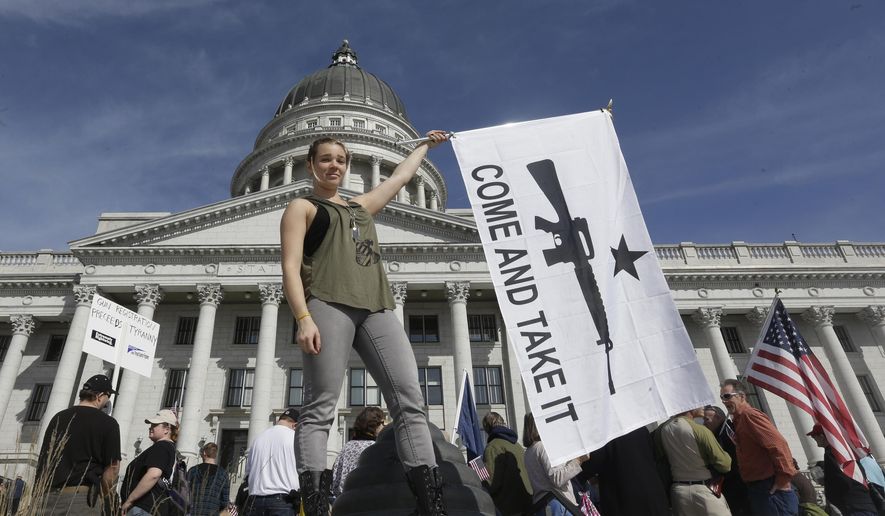Second Amendment advocates stung by the Supreme Court’s decision not to take up a closely watched gun rights case vowed Monday to pursue litigation as long as it takes to get the justices to affirm the right to carry a firearm outside the home.
The court opted Monday not to hear Peruta v. California, letting stand a ruling from the 9th U.S. Circuit Court of Appeals that upheld a California law requiring a gun owner to show “good cause” in order to get a permit to carry a concealed handgun in public. The state law left the authority to decide what constitutes “good cause” up to local authorities such as sheriffs or police chiefs.
Gun owner Edward Peruta, of San Diego County, brought the case after he sought to carry concealed firearms for self-defense but was denied a concealed carry license in 2009 because he was unable to show good cause.
While the justices did not offer a written explanation of their reasoning, Justice Clarence Thomas issued a strong rebuke of his colleagues’ decision not to hear the case.
“The Court’s decision to deny certiorari in this case reflects a distressing trend: the treatment of the Second Amendment as a disfavored right,” wrote Justice Thomas, joined by Justice Neil M. Gorsuch in his dissent.
Challengers had asked the Supreme Court to consider whether the Second Amendment entitles citizens to carry handguns outside the home in a concealed manner when the open carry of firearms is prohibited by California law.
Justice Thomas wrote that the lower court’s ruling erred because it had narrowly considered only whether the regulatory concealed carry scheme established by a local sheriff was valid, not whether residents had a broader right to carry firearms openly in public. He also faulted his colleagues for failing to seriously consider the effect that letting the decision stand would have on everyday Americans.
“For those of us who work in marbled halls, guarded constantly by a vigilant and dedicated police force, the guarantees of the Second Amendment might seem antiquated and superfluous,” Justice Thomas wrote. “But the Framers made a clear choice: They reserved to all Americans the right to bear arms for self-defense. I do not think we should stand by idly while a State denies its citizens that right, particularly when their very lives may depend on it.”
Though disappointed by Monday’s ruling, a gun rights attorney involved in the case said advocates have plenty of other options to eventually present the court with the question of carrying a firearm in public.
“Our plan is to get a case to the Supreme Court as soon as possible. Peruta was one of the cases that we saw as a vehicle for that,” said Chuck Michel, one of the attorneys involved in the Peruta case. “But we didn’t put all our eggs in this basket.”
Likewise, the National Rifle Association was also looking forward to going to the mat in future litigation.
“We look forward to a future Court affirming that the right to keep and bear arms is as much a part of our Constitution as the other enumerated rights that it protects,” said Chris W. Cox of the NRA’s Institute for Legislative Action. “We will not stop fighting until a future Court affirms this fundamental right.”
For groups that support more stringent gun laws, the decision was a “win for gun safety,” said Eric Tirschwell, litigation director for Everytown for Gun Safety.
“The Peruta decision is consistent with four other federal appeals courts all across the country that have found the Second Amendment leaves plenty of room for states and localities to make their own determinations about who can carry a concealed handgun in public,” Mr. Tirschwell said.
In addition to the 9th Circuit, federal appeals courts have upheld similar restrictive “good reason” requirements in New Jersey, New York and Maryland.
An ongoing challenge of similar requirement in the nation’s capital was argued before the U.S. Court of Appeals for the D.C. Circuit in September and awaits a ruling.
Two cases that Mr. Michel believes could eventually make their way to the Supreme Court include the ongoing challenge in Washington and the Flanagan v. Becerra lawsuit brought in California in the wake of the lower court’s Peruta ruling.
California law prohibits open carry in populous areas. Plaintiffs in the lawsuit, all residents of Los Angeles County, argue that their Second Amendment rights are being violated because they are not allowed to openly carry in Los Angeles, nor are they able to obtain concealed carry permits.
“If you say there is no concealed carry right, then there is either a right to open carry or there is no right,” Mr. Michel said of the Flanagan case, which was argued before the U.S. District Court for the Central District of California in February. “We are taking them at their word.”
Gun rights advocates did score one victory Monday.
The Supreme Court also declined to take up Binderup v. Sessions, a case that will now let stand a ruling that found individuals convicted of certain nonviolent misdemeanor crimes do not lose their right to keep and bear arms.
• Andrea Noble can be reached at anoble@washingtontimes.com.




Please read our comment policy before commenting.